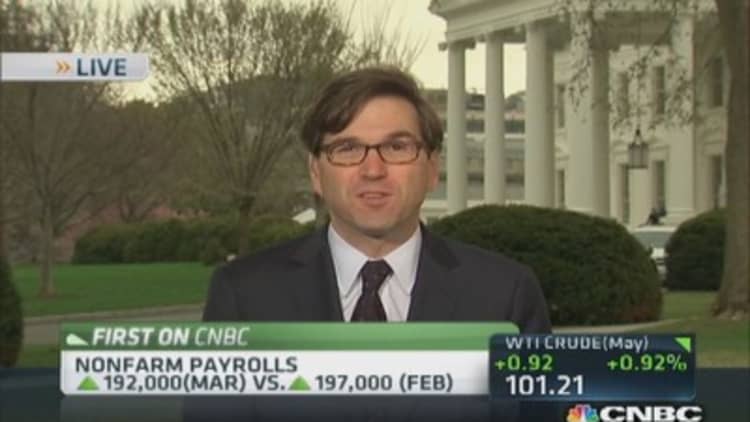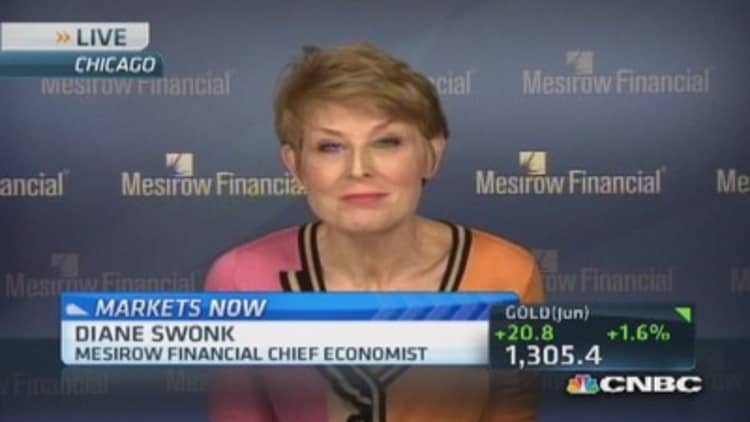Democrats badly needed a blockbuster jobs report on Friday to set the stage for stronger growth heading into the midterm election campaign. They didn't get it.
The March report showing a gain of 192,000 jobs and no change to the 6.7 percent jobless rate was not horrible. It only missed consensus by 8,000 and the slight increase in the labor force was good news.
But it was the kind of "meh," status quo number that is likely to do nothing about the fact more than half the country thinks the U.S. is still in recession. Nor is the number likely to change the fact that 56 percent of the country disapproves of the way President Barack Obama is handling the economy.
Democrats were hoping for a much bigger number and so was Wall Street, with many expecting the catch-up effect from a brutal winter would drive the number well over 200,000.
Read MoreMarch jobs report proves a just-right mix
Those bigger numbers could still come later this spring but right now it looks the economy we have now—slow growth, depressed wages, dour consumers—is the one Democrats are going to be stuck with heading into November.
The party will of course claim that things could be much better if only the GOP-controlled House would approve a minimum wage hike, more infrastructure spending and other Obama priorities.
That argument is not entirely without merit and will undoubtedly help draw out Democratic base voters who might otherwise stay home without Obama on the top of the ticket in November. But even party insiders acknowledge it's a backup strategy to stem sharper losses rather than the kind of offense Democrats would like to play on a strengthening economy.

"All of it sounds kind of desperate to be honest," said one senior Democratic hand in Washington who did not want to be quoted by name disparaging his own party. "It's really going back and dusting off our old playbook."
Read MoreWhy Democrats really need a stellar jobs report Friday
It's also not at all clear that this "Fair Shot" agenda (which is very reminiscent of Al Gore's "the people versus the powerful" campaign) can keep Democrats from losing the Senate where they face tough races including in Louisiana, North Carolina and Arkansas where appeals to the base may not be enough to squeak out close victories.
The White House on Friday was left saying what it has been saying for seemingly the last five years: This is pretty good but we'd like to see better. "This is consistent with the steady, solid recovery we've had," a grim looking White House senior economic adviser Jason Furman told CNBC from the White House lawn.
But "steady" is probably not going to be good enough for a party saddled by an unpopular health-care law and unpopular president. There is also the fact that the party that controls the White House tends to lose seats in the sixth year of a two-term president's tenure.
Read MoreShocked by Nate Silver's GOP Senate prediction? Don't be
Since World War II, only one president has bucked that trend: Bill Clinton in 1998. But Clinton had a booming economy that was growing over 4 percent. Clinton also benefited from blowback against Republicans in the House who impeached him over the Monica Lewinsky sex scandal.
Obama will likely benefit from some anger at House Republicans—the party is held in as low repute as the president—but it is the trend in the economy that will really matter in the voting booth and right now the story is not good.

Many economists are still hoping for a stronger run of growth in the spring and summer driven by a long-delayed uptick in small-business spending on capital goods. But they have been hoping for that for at least a couple of years and it has not materialized.
Clinton in 1998 had some months of weak jobs growth (March of 1998 showed a gain of just 151,000, less than March 2014). But later months in 1998 showed much stronger gains, including over 400,000 in May of that year.
Perhaps nothing exemplifies the current Democratic predicament than their talking point Friday that the labor force has now inched back above where it was in 2008 before the crash and Great Recession. But that factor does not account for the 2 million people who have joined the labor force since the recession began.
And it suggests Democrats are happy to cheer for getting back to the status quo, which given current negative attitudes toward the economy is not going to be anywhere near good enough to avoid disaster in the fall.
—By Ben White. White is POLITICO's chief economic correspondent and a CNBC contributor. He also authors the daily tip sheet POLITICO Morning Money [politico.com/morningmoney]. Follow him on Twitter @morningmoneyben.



